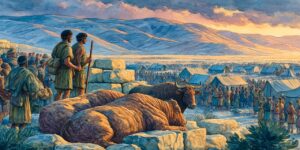
Peace
The gospel claims something bold: God offers real peace. Peace with Him, peace inside yourself, and peace with other people. But that peace isn’t automatic…

For I would have you know, brothers, that the gospel that was preached by me is not man’s gospel. For I did not receive it from any man, nor was I taught it, but I received it through a revelation of Jesus Christ. For you have heard of my former life in Judaism, how I persecuted the church of God violently and tried to destroy it. And I was advancing in Judaism beyond many of my own age among my people, so extremely zealous was I for the traditions of my fathers. But when he who had set me apart before I was born, and who called me by his grace, was pleased to reveal his Son to me, in order that I might preach him among the Gentiles, I did not immediately consult with anyone; nor did I go up to Jerusalem to those who were apostles before me, but I went away into Arabia, and returned again to Damascus.
Galatians 1:11–17
When Paul writes to the churches in Galatia, he writes with a troubled heart. These were people he had personally led to Christ—men and women who had embraced the almost unbelievable news that God makes us His children entirely by grace. Salvation, Paul taught, is not earned. It is received. It is the gift of a God who loves far more generously than we deserve.
But after Paul left Galatia, other teachers came. They questioned Paul’s authority and offered the Galatians a far more “comfortable” message: perhaps grace is not enough. Perhaps you must add effort, rules, and rituals to secure God’s approval. Legalism—doing in order to earn—always feels natural to human beings. It mirrors our workplaces, our social exchanges, even our friendships. We instinctively want credit. We instinctively want to prove something.
Paul sends his letter to say: Don’t go back. Don’t trade grace for chains.
Paul understands legalism better than anyone. Before he met Christ, he was Saul—the rising star of the Pharisees, studying in the finest religious school, excelling in all the rituals, enforcing the strictest laws. He knew the system, mastered the system, and believed it could make him righteous.
It couldn’t.
His zeal led him to violence. When Stephen proclaimed Jesus as Messiah, Saul stood holding the coats of the men who stoned him. He approved. He believed he was defending God.
So when Paul warns the Galatians about legalism, he’s not writing theory. He is saying:
“I tried that path. I knew it better than you. And it only leads away from God.”
Grace, by contrast, is not about human effort. It is not about the “physical adaptation” of doing good and avoiding bad. Grace is transformation—God reshaping your desires, your mind, your priorities, your entire way of being.
Legalism says:
“Improve yourself until God accepts you.”
Grace says:
“God accepts you—and that changes you.”
Paul describes his own transformation on the Damascus Road. Blinded physically, he finally saw spiritually. The persecutor became the preacher. The enemy became the apostle. His ambitions, his loyalties, his energies—everything—were redirected.
Grace didn’t adjust Paul. It remade him.
Paul also knows something else: the gospel of grace creates conflict.
We live in a world where the values of Christ and the values of culture collide. That’s not new. Saul persecuted believers believing he was serving God. Today persecution plays out in many countries for political, social, or religious reasons. Whether in North Korea, Nigeria, or parts of the Middle East, Christians still face violent opposition simply for following Jesus.
And yet Scripture says the true battle is not primarily physical. It is spiritual. Paul writes in Ephesians that we fight “against rulers, authorities, and spiritual forces of evil.” The physical persecution we see is only the surface of a deeper war. And if we are to endure faithfully, we must prepare spiritually.
Paul’s imagery of spiritual armor is not about aggression—it is about stability, clarity, courage:
The helmet of salvation: a mind anchored in truth
The breastplate of righteousness: protection from accusation
The belt of truth: direction and integrity
The shield of faith: extinguishing the enemy’s lies
The sword of the Spirit—the Word of God
Feet fitted with the readiness of the gospel: prepared to go anywhere
This armor reminds us:
We do not fight evil with evil.
We do not fight hatred with hatred.
We fight spiritual battles with spiritual weapons—truth, love, conviction, courage, the gospel.
We often want to decide who is “open” and who is not, who is worth sharing Christ with and who is not. But Paul’s conversion destroys every assumption. Saul—a violent religious extremist—became Paul, the greatest missionary the world has ever known.
Who saw that coming?
No one.
Which means we cannot judge who God might transform. The persecutor today might become the preacher tomorrow. Our role is not to filter the audience. It is to obey.
The world still produces “Sauls”—men filled with hatred, violence, and zeal for false gods. Some persecute Christians openly. Some imprison, torture, or kill. Headlines remind us constantly. The sermon recalled the moment in 2015 when 21 Christian construction workers in Libya were executed simply for confessing Jesus. They refused to deny Christ. They died with His name on their lips.
It is sobering. It is heartbreaking. It is also proof that grace can produce courage nothing else can.
Felix Adler once wrote:
“The hero kindles a great light in the world.
The saint walks through the darkness with a light in himself.”
Holiness is not perfection. It is consecration—being set apart for God. Saints are not flawless. They are surrendered.
And surrendered people shine.
Paul’s message rings across centuries:
Share Christ widely and boldly.
Walk into the world with the armor of God.
Trust the Spirit, not your strength.
Remember that the Saul you fear today could become the Paul who shapes tomorrow.
And above all:
Anchor your life in the grace that transformed Paul—and still transforms us.

The gospel claims something bold: God offers real peace. Peace with Him, peace inside yourself, and peace with other people. But that peace isn’t automatic…

Advent starts by asking us to slow down and look past the distractions. Every culture wraps Christmas in its own extras—traditions, shopping, decorations, sentimental ideas.

Jesus leaves the synagogue in Capernaum and steps into a home. Simon Peter’s mother-in-law lies with a high fever.

Paul writes to a church he has never visited, yet he sounds like a pastor who knows them well: he encourages, challenges, and points every road back to Christ…

Biblical hope isn’t wishful thinking or daydreams. It is a confident expectation anchored in what God has already done in Christ and what he has promised to complete…

The story of Jabesh-Gilead opens like a political crisis—but it carries deep spiritual meaning. After Israel had settled in the Promised Land, their incomplete obedience left enemy nations still scattered

Israel was barely out of Egypt when another crisis surfaced—not water, food, or enemies, but leadership overload. Moses spent sunrise to sunset judging disputes for a nation of hundreds of

Paul writes to the church in Colossae with one urgent theme: don’t trade the real thing for a shadow…

Moses stood where all could see, staff raised—no magic, just a visible confession: victory belongs to the Lord. When his arms drooped, Israel faltered; when Aaron and Hur braced them,